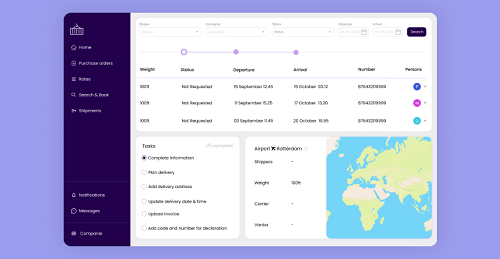Logistic Software Market Size, Share & Trends | Growth [2032]

Logistic Software Market Overview:
The logistic software market has become integral to the modern supply chain, enabling businesses to optimize operations, improve efficiency, and reduce costs. This market encompasses various software solutions, including warehouse management systems (WMS), transportation management systems (TMS), and supply chain management software. These solutions streamline logistics by automating processes, offering real-time visibility, and ensuring effective resource utilization. The Logistic Software Market size is projected to grow USD 22.3 billion by 2032, exhibiting a CAGR of 8.00% during the forecast period 2024 - 2032. The global surge in e-commerce, coupled with the demand for faster and more accurate deliveries, is driving the expansion of this market. Additionally, the integration of advanced technologies such as artificial intelligence (AI), blockchain, and the Internet of Things (IoT) into logistics software is reshaping the industry landscape.
Get a sample PDF of the report at –
https://www.marketresearchfuture.com/sample_request/4420
Key Players:
Several key players dominate the logistic software market, contributing to its growth through innovation and strategic collaborations. Prominent companies like,
- SAP SE
- Oracle Corporation
- Blue Yonder Group
- Manhattan Associates
offer comprehensive solutions tailored to diverse industry needs. Startups such as FourKites and project44 are also gaining traction with cutting-edge visibility and predictive analytics tools. These companies leverage advanced technologies to provide real-time tracking, data-driven decision-making, and seamless communication across supply chain stakeholders. The competition in the market is fostering continuous advancements, making it increasingly competitive yet dynamic.
Market Trends:
The logistic software market is witnessing significant trends that underline its transformation. The adoption of AI and machine learning (ML) for predictive analytics and demand forecasting has become a critical component of modern logistics. Blockchain technology is gaining momentum for its ability to enhance transparency and traceability in supply chains. Moreover, cloud-based solutions are becoming increasingly popular due to their scalability, cost-effectiveness, and ease of implementation. Automation in logistics processes, from robotic process automation (RPA) in documentation to autonomous vehicles in transportation, is also shaping the future of the market. The emphasis on sustainable logistics solutions, driven by environmental concerns, is another noteworthy trend.
Market Segment Insights:
The logistic software market can be segmented based on software type, deployment mode, enterprise size, and end-use industry.
Software Type: Key categories include warehouse management systems, transportation management systems, and supply chain management solutions. Among these, TMS is experiencing significant growth due to the rising need for efficient transportation planning and execution.
Deployment Mode: The market is divided into cloud-based and on-premise solutions. While cloud-based software dominates due to its flexibility and lower upfront costs, on-premise solutions remain relevant for organizations with stringent data security requirements.
Enterprise Size: Both small and medium-sized enterprises (SMEs) and large enterprises contribute to the market, with SMEs increasingly adopting logistics software to streamline operations and compete effectively.
End-Use Industry: Key sectors utilizing logistics software include retail, manufacturing, healthcare, automotive, and e-commerce. The e-commerce sector, in particular, is a significant driver, given the rising consumer expectations for fast and reliable deliveries.
Browse a Full Report –
https://www.marketresearchfuture.com/reports/logistic-software-market-4420
Regional Insights:
The logistic software market exhibits a strong regional presence, with North America leading due to the early adoption of advanced technologies and a robust logistics infrastructure. The United States, in particular, accounts for a significant share, driven by a flourishing e-commerce sector and innovation from leading tech companies. Europe follows closely, with countries like Germany, France, and the UK emphasizing automation and sustainability in logistics.
Asia-Pacific is emerging as a lucrative region for the logistic software market, driven by rapid industrialization, growing e-commerce platforms, and government initiatives to modernize supply chains. China and India are notable contributors, owing to their large populations and thriving manufacturing sectors. Additionally, Latin America and the Middle East & Africa are witnessing steady growth as businesses in these regions increasingly recognize the benefits of adopting logistics software.
The logistic software market is poised for continued growth, fueled by technological advancements and evolving industry demands. As companies prioritize efficiency, transparency, and sustainability in their supply chains, the adoption of innovative logistics solutions will become even more critical. Stakeholders must stay abreast of market trends and leverage emerging technologies to maintain a competitive edge in this dynamic landscape.
Contact
Market Research Future (Part of Wantstats Research and Media Private Limited)
99 Hudson Street, 5Th Floor
New York, NY 10013
United States of America
+1 628 258 0071 (US)
+44 2035 002 764 (UK)
Email: sales@marketresearchfuture.com
Website: https://www.marketresearchfuture.com
- Art
- Causes
- Crafts
- Dance
- Drinks
- Film
- Fitness
- Food
- Jogos
- Gardening
- Health
- Início
- Literature
- Music
- Networking
- Outro
- Party
- Religion
- Shopping
- Sports
- Theater
- Wellness
- Travels

